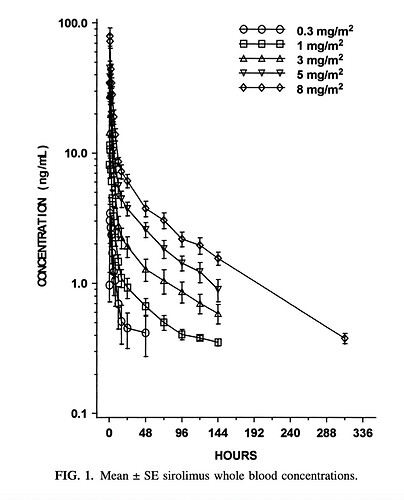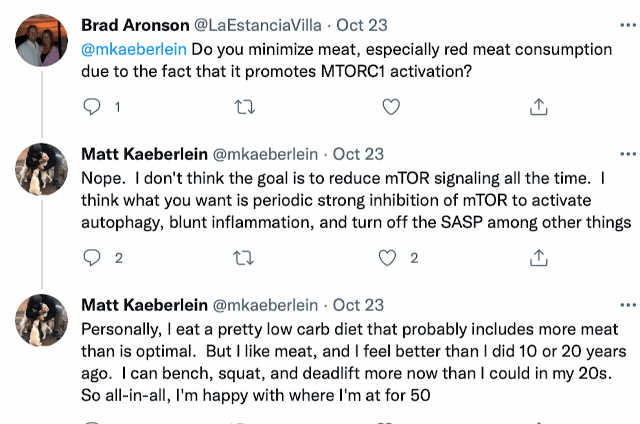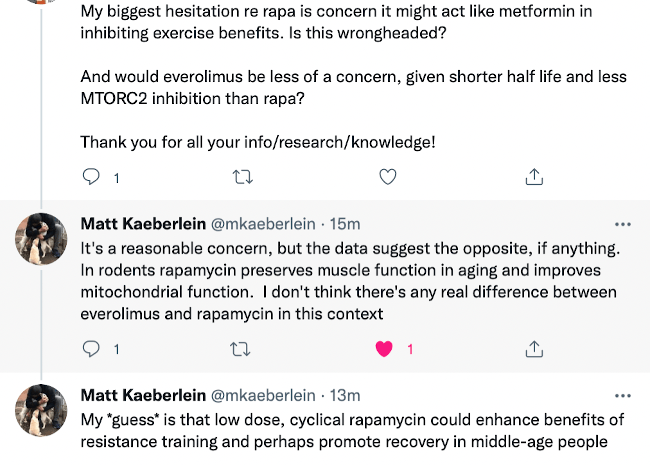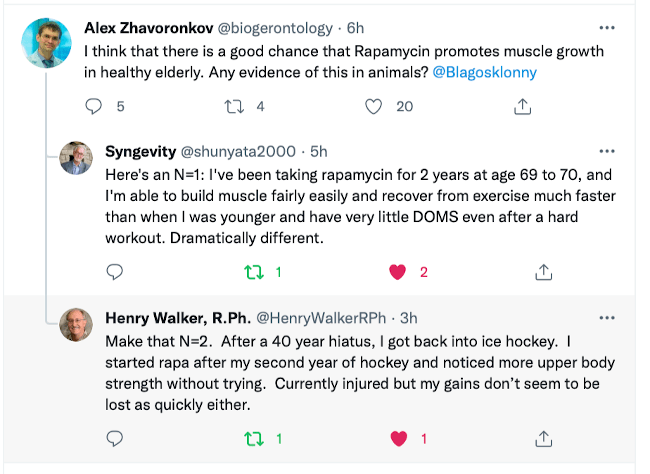I’ve avoided metformin due to evidence it inhibits the benefits of exercise. (I exercise a LOT.)
Does anyone know whether rapamycin (or rapalogs like everolimus) have any similar inhibitory effects?
Thank you!
I’ve avoided metformin due to evidence it inhibits the benefits of exercise. (I exercise a LOT.)
Does anyone know whether rapamycin (or rapalogs like everolimus) have any similar inhibitory effects?
Thank you!
Hi, welcome to the forum. Good question. What types of exercise do you do?
I also stopped taking metformin because of the negative impact on muscle regeneration after exercise (and moved on to canagliflozin and then empagliflozin - and empagliflozin at a low dose seems to be working ok).
There is theory and there is reality when it comes to rapamycin and exercise… the theory/science is that MTOR is required for muscle growth and regeneration. And - if you completely inhibited MTOR, All the time, it probably does block muscle growth and benefits of exercise.
But - the research shows that rapamycin doesn’t completely inhibit MTOR - even at high doses. See this paper: Rapamycin inhibits mTORC1, but not completely
But - if you look at the blood levels of rapamycin after taking a dose, and we assume that a person is on a pulsed, weekly or bi-weekly dosing schedule for their rapamycin. Then, in this case the MTOR inhibition seems to take place mostly during the first half of your higher blood levels period, and as the blood level goes down there is less and less MTOR inhibition.

If you’re exercising the entire time (say, daily) - its not a problem - and is actually recommended by many of the doctors (Dr. Peter Attia and others). Exercising during the period of higher MTOR inhibition helps conserve your muscle, and exercising when you are out of there MTOR inhibition period seems to likely be a period of regular / good muscle growth and regeneration, and you gain the regular benefits of exercise.
When you’re taking the rapamycin - I haven’t heard of anyone who has noticed any difference in terms of how you feel while exercising (and on the typical anti-aging protocols for rapamycin use). I’m in much better shape now after two years of rapamycin - and I exercise 3 to 5 times a week, a combo of cardio, weights, indoor rock climbing, mountain biking, kayaking, etc. - and feel great. My muscles are growing stronger, and I can lift more each month. Rapamycin does, however, seem to make it easier to lose fat/ weight and maintain that loss - in effect probably helping give you that well-defined body that many people who exercise appreciate or desire. In fact, in the PEARL study, the key endpoint they are measuring against (because a researcher has seen this as one of the strongest, consistent outcomes in mammal studies) is visceral fat reduction. So, if you want to be as lean as you might have been in your 20s; rapamycin seems to help towards that goal, and even more so if you’re exercising regularly.
There is a well known personal trainer named PD Mangan with a microbiology background who uses rapamycin and touts its benefits. He posts photos with claims about how rapamycin (along with lots of exercise and a more keto-oriented diet) has helped him achieve the fitness he’s gained in the past few years. He’s posted pre-training, pre-rapamycin and then the post training/rapa photos online - click here and you can see the rapamycin isn’t preventing him from getting fit.
Here is some research on the topic:
This is a good video where well-known geoscientist Brian Kennedy talks about the subtleties of MTOR inhibition and muscle growth, and longevity:
Thank you for the informative answer and links! I’m really glad I found this resource.
I’m also on empagliflozin. Started with 10mg and moved up to 25mg, and my blood work significantly improved. I’m mostly keto, except I eat fruit, and when I do I also take some acarbose. Rapamycin has been the pharma intervention I’m most interested in, though it’s been an uphill battle trying to convince my doctor to give me a prescription.
I’ve been ok with taking it slow because I was still unclear on the exercise interactions (I exercise 6 days per week, often 2x per day) and don’t want anything to interfere with those benefits. Thank you again!
Here is a twitter discussion that touches upon the concerns you’ve mentioned:

and, with regard to age related weakening of the muscle (sarcopenia):


Thanks! I follow Matt Kaeberlein on Twitter (and loved both his Peter Attia episodes) but must have missed this one.
Given the periodicity issue, do you think everolimus would be better in this sense than rapa? Due to its shorter half life and lower inhibition of MTORC2?
There seems to be a shortage of everolimus vs sirolimus comparison studies outside the kidney-transplant daily dosing realm. I turned 50 last week and told myself this is the age when I would start, so I’m trying to iron out the last wrinkles in my plan. I really appreciate your advice here!
This is a good question - and everolimus looks very interesting for a number of reasons, not the least of which is the shorter half-life of the drug. But - as you also note, there is very little research on it and given it is now a generic drug, little research will be done on it going forward.
I have not seen any papers that convey it has less inhibition of mTORc2 - but I haven’t researched everolimus that much. Where did you see that?
The issue with everolimus is that while it seems to work identically to rapamycin, there have been no lifespan studies using everolimus, so nobody knows if its as good as, or better, or worse, than rapamycin in terms of lifespan enhancement. But - given its success in the Mannick RAD001 (everolimus) 2014 paper, it seems likely that its very close.
From my own personal experience I think you’re vastly over-thinking this potential issue. Lots of us taking rapamycin are having no problem increasing muscle mass and growth (while also becoming leaner and even losing weight) - so I see no reason to believe that your results will be any different. And - ultimately you won’t know for certain until you try it. Keep your existing work out schedule, track your exercise results, and see what happens. Report back and let us know - but I strongly suspect it will be much better than “fine”.
Also - perhaps of interest:
@AgingHippie is another person who can vouch for increasing muscle strength and mass while on rapamycin. I recently saw (what I believe was him) post this in another forum:
I’ve experienced ZERO effects on my exercise regimen while on Sirolimus and MetforminER.
Yet I continue to see studies like this?
So the question is how many people in this group use Metformin and if yes has it affected your exercise results on any way?
In summary - all the scientific and anecdotal evidence is consistent, and there is not any reason to think this is an issue.
And, for anyone else concerned about this - Matt Kaeberlein, probably the leading expert on the topic weighs in:

More anecdotal evidence on this theme:

Reading:
Full thread on twitter here:
Another video very relevant to the issue of this topic. A new clinical study taking place in the UK focused on use of rapamycin for prevention of muscle aging. Some good information on the science behind why it seems to be working…
I am not sure if the posts in this subreddit r/rapagains account for the content in the recent discussions, but it’s worth checking out.
But as Kaeberlein says above, we’re looking for a periodic strong inhibition of mTOR to activate autophagy/blunt inflammation, etc. Thus, wouldn’t it make sense to avoid nutritional/exercise stimulators of mTOR at least for the couple of days immediately after taking the rapamycin such that mTOR is maximally inhibited during that 2-day window? i.e. for instance, take rapamycin early Sunday morning and avoid protein supplements, insulin spikes and high-intensity exercise for all of Sunday/Monday while rapa levels are highest, then go back to normal diet/exercise on Tuesday. That way I’m maximizing mTOR inhibition 2 days per week. Why counteract the mTOR inhibition (even if only partially) on Sunday/Monday by eating/drinking protein, weight lifting, etc, when I could be doing things that synergize with it such as fasting (or at least partial fasting such as low protein, etc), doing light cardio/yoga instead of weights, etc?
Not sure that I agree about exercise though I agree with fasting.My routine which I am interested in your comments on is to take 6mg Rapamycin in the evening and then the next day have no food other than coffee until at least 1600. During this time I do exercise vigorously for about 2 hours and find that I have very good energy levels and a very good mood.
Interested in comments on this.
We know that vigorous exercise activates mTOR in the muscles (and brain?). What I don’t know is quantitatively how much the exercise is blunting the inhibition from the rapamycin, but it’s reasonable to believe that it is. If it indeed is, then you’d be missing out on some of the long-term benefits of rapamycin for muscle (and brain?), at least compared to if you skipped the vigorous exercise on day1/day2). How you “feel” that day subjectively imo would be irrelevant.
It’s established that there are pathways of muscle building that go around mTOR, so we know we can exercise and still get some benefits of exercise even while mTOR is inhibited (although mTOR inhibition likely blunts short-term muscle hypertrophy at least to some extent). But we want cyclical mTOR inhibition on muscle tissue. We don’t want to just inhibit it everywhere else and skip muscle. mTOR inhibition in muscle tissue helps reverse senescence, increases autophagy, and appears to help build muscle (or at least prevent muscle loss) in the long run. Therefore, it would seem counter-productive in the long run to engage in high-intensity exercise in the immediate post-rapa-ingestion period while mTOR inhibition is maximally inhibited. It would be like eating a Twinky while fasting (although hopefully not as dramatic an effect).
I’m hoping Blagovskonny will address the above topic. He’s teased it on his web site, but so far I haven’t seen anything specific from him on this.
Excellent point. I’ve noticed an extended period of muscle soreness from intense workouts done in the first few days after weekly rapa dose compared to identical workouts done later in the cycle or during a wash down. I was wondering if I was wasting effort to be working out when rapa level is high. I hadnt considered that I also might be blunting the effect of mTOR1 inhibition. Yes, I hope that Blagoskonny will address this issue.
It really could go either way. I do one 72 hour fast per month. The rest of the month, my exercise is all Brazilian jiu jitsu plus supplemental cardio, but during my fast I add in weights (squats, deadlifts) to preserve muscle mass through the fast. Peter Attia is pretty adamant about doing this through his fasts–there may be a parallel for rapamycin?
I’m still waiting for my order to arrive from India. Once it does and I start, I’ll report back. I measure everything every morning (RHR, HRV, blood glucose, lactate, etc.). HRV especially may show how how the rapamycin is impacting recovery.
I just think it’s important to keep in mind that we’re talking about 2 separate (albeit related) things here. 1) the effect of rapamycin on muscle growth/recovery from intense exercise, and 2) the effect of exercise on the long-term muscular benefits of rapamycin
Topic #1 would be the acute effect of rapamycin on dampening mTOR and acutely inhibiting protein synthesis after high intensity exercise. We know from at least one recent study that there are some redundant pathways for muscle protein synthesis, such that we can still get some hypertrophy even in the presence of rapa, albeit less.
Topic #2 (and the most important by far, IMO) would be the possible blunting of mTOR suppression by high-intensity exercise during the 2+ day window of maximal mTOR suppression by rapa, repeated week after week x months/years. The blunted mTOR suppression could partially negate increased autophagy, stem cell rejuvenation, etc etc.
Even if mTOR suppression by rapa can’t be directly blunted by exercise (or insulin spikes, etc), might not some of those same redundant non-mTOR-dependent protein synthesis pathways blunt the otherwise-beneficial effect of the rapamycin? It still seems, at least intuitively, that we’re wishfully thinking we can have our cake and eat it too by training intensely during maximal mTOR suppression periods, but I hope I’m wrong!
Ok, this researcher and I seem to be on the same page. He’s designed a study where he wants to give rapa 5mg once weekly to older adults and have them exercise, seemingly on the days when mTOR is not maximally inhibited (although he doesn’t specifically give the weekly timeline), to see if this regimen increase muscle size/performance over and above placebo+exercise. He explains the rational very well in the included video.